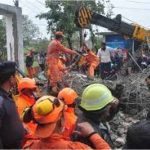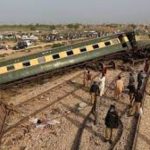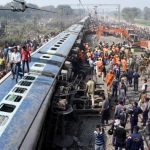Rescue and relief efforts are still underway after an Indian passenger train derailed and many of its cars overturned on Thursday, resulting in at least two deaths and twenty-four injuries.
The primary mode of transportation in India is its railway system, however it is ill-funded and frequently experiences fatal accidents.
The 22-car Chandigarh-Dibrugarh Express, a 2,640-kilometer (1,640-mile) passenger service, derailed close to the northern Hindu holy city of Ayodhya, according to India’s Railways spokesman Pankaj Kumar Singh
Uttar Pradesh state relief commissioner Naveen Kumar told journalists that another 35 were injured, three of them seriously.
The cause of the incident was not immediately clear.
At least four carriages had overturned at the site of the accident in Gonda district, according to reports.
“The train accident in Gonda district is extremely sad,” Uttar Pradesh chief minister Yogi Adityanath posted on social media platform X.
“District administration officials have been directed to carry out relief and rescue operations on a war footing and to take the injured to the hospital,” he added.
“I pray to Lord Ram for the speedy recovery of the injured.”
India has launched a $30 billion railway infrastructure modernisation in a bid to boost the economy and connectivity.
But analysts say that while the number of accidents has gone down over time, India’s antiquated rail system still has a long way to go.
An average of 20,000 people died each year between 2017 and 2021 in rail accidents — collisions, derailments and other causes — according to official records.
Defective tracks, poor maintenance and old signalling kit combined with human error were the main cause of derailments, a report by India’s top audit authority said.
Last year, approximately 300 people were murdered when a passenger train collided with a halted goods train, resulting in the derailed compartments striking another fast-moving passenger train.
The biggest rail catastrophe in India occurred in 1981, when a hurricane pushed a train off its rails and into a river in Bihar state, killing 800 and injuring over 100.
Indian Railways, the world’s fourth-largest rail network, operates around 14,000 trains each day with 8,000 locomotives across a massive network of tracks totaling 64,000 kilometers.
Every day, more than 21 million people travel by rail.














